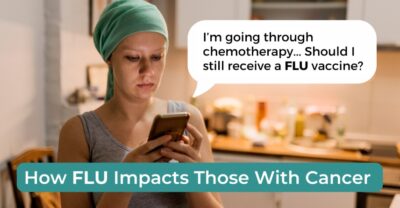
- Flu Facts
- Flu Vaccine Information
Flu Vaccine & Cancer: Should You Get Vaccinated?

Going through cancer treatment is hard enough. It takes a physical and mental toll on all those who are going through it (and their loved ones). Not to mention, after undergoing treatment, there’s always the fear of the unknown about if the treatment worked, and if the cancer will return. One added worry that cancer patients should not have to deal with is the extra burden of getting a bad case of the flu. While it’s certainly a risk, the best thing someone undergoing chemotherapy (or just finished treatment) can do is to get an annual flu vaccine.
First Things First: Cancer itself does not put people at risk of flu, but flu vaccination is necessary for people living with cancer, and their loved ones, to help prevent complications and delays in cancer treatment. For example, while undergoing chemotherapy, bone marrow transplants, and/or stem cell transplants, treatments can weaken the immune system, and those with weakened immune systems (also known as being immunocompromised) are more likely to have flu complications because they have less immunity overall. In particular, lymphoma patients can have difficulty creating antibodies against the flu even when they get vaccinated. That said, flu vaccination for the entire family is key to protecting vulnerable individuals.
Aviva Katz is one example to learn from. She was a pediatric surgeon recovering from leukemia who died from the flu. Aviva’s husband, Daniel said that getting a flu vaccine is like wearing a seatbelt – even if you have never had a serious case of the flu, you should still get the shot, similar to the fact that even if you’ve never been in a car accident, you should still wear a seatbelt. Read her story here.
Should those undergoing chemotherapy get a flu vaccine?
Yes. Chemotherapy is a special medicine that shrinks or kills cancer cells. It is most often given with an IV, through a thin needle that is placed in a vein on your hand or lower arm. There are many different chemotherapy drugs. Which ones are included in your treatment plan depends mainly on the type of cancer you have and how advanced it is, whether you have had chemotherapy before, and whether you have other health problems, such as diabetes or heart disease. Chemotherapy is also given in cycles, which includes a period of chemotherapy treatment followed by a period of rest.
During chemotherapy, vaccination is recommended anytime, but it may be best between cycles or two weeks before treatment starts. Although cancer patients may have a weaker response to flu vaccination, flu vaccination can still be protective. Because transplantation lowers the number of immune cells in the body that can defend against the flu, your doctor may recommend waiting four to six months after the transplant or receiving the flu vaccine well before transplantation. Talking to your doctor about your treatment plan and the best time for vaccination is important in your overall care.
It’s also important to note that people currently living with cancer should not receive the nasal spray flu vaccine because it contains live viruses. Equally as important is that family, friends, and caretakers of those with cancer should also be vaccinated against the flu to protect cancer patients who have a weakened immune system. You and those around you should also take steps such as frequent hand washing, disinfection of high-touch surfaces, and wearing a mask when out in crowded areas to limit any contact.
Should cancer survivors get a flu vaccine?
Yes! After receiving your treatments, your immune system is still weakened for a number of months. Therefore, taking precautions after cancer is equally important, so you do not suffer from complications from the flu.
If you do start experiencing symptoms of flu during or after cancer treatment, it’s imperative you call your healthcare provider right away to get tested. The CDC recommends you take flu antiviral drugs to treat flu illness if prescribed. If you get sick, antiviral drugs can make your illness milder and shorten your sick time. They may also prevent serious flu complications. If someone with cancer does have flu symptoms, don’t wait – call your doctor immediately if you have a fever. If you get a fever during your chemotherapy treatment, it’s a medical emergency.
Flu and chemo should not go hand in hand. Have a plan in place before you undergo treatment about ways to prevent the flu, getting your flu vaccine and what to do if you do get sick. That way, you are prepared and ready to fight both cancer and the flu. Talk to your doctor and your loved ones. Your care team is rooting for you!


